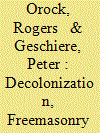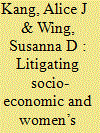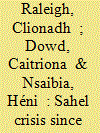|
|
|
Sort Order |
|
|
|
Items / Page
|
|
|
|
|
|
|
| Srl | Item |
| 1 |
ID:
185366


|
|
|
|
|
| Summary/Abstract |
Relating to academic debates on the emergence of moral panics over homosexuality in several parts of Africa, this article examines rumours on homosexuality as a political issue that connects colonial pasts and postcolonial struggles in Cameroon. We link current struggles over homosexuality to broader debates about the question of Cameroon’s decolonization from France. The article focuses on the figure of Dr Louis Paul Aujoulat, a French colonial official in Cameroon who played a crucial role in the country’s decolonization in the 1950s. Aujoulat died in 1972, but recently, he made a ‘return’ in rumours and public debates in a new role: he is now accused of having ‘sodomized’ the emergent new elite of Cameroon, thus introducing homosexuality; moreover, he is linked to Freemasonry and occult initiation rites. Our aim was to show how a particular decolonization trajectory—very rocky in the case of Cameroon—is related to the present-day moral panic about a supposed proliferation of homosexuality. Freemasonry and its special history on the African continent—notably its role in maintaining the coherence of Françafrique between France and its former colonies—is a severely understudied topic. Its linkages to same-sex practices and illicit enrichment give the Cameroonian case a wider relevance. We argue that the new rumours on Dr Aujoulat define him as a key figure in linking Freemasonry, homosexuality and illicit enrichment to present-day issues of state governance, citizenship and elite misrule in Cameroon.
|
|
|
|
|
|
|
|
|
|
|
|
|
|
|
|
| 2 |
ID:
185365


|
|
|
|
|
| Summary/Abstract |
Prevailing constructivist scholarship argues that the evolution of regional organizations is due to the influence of global norms such as liberal democracy. Alternative rational choice theories suggest there might be efficiency gains that explain the evolution of international organizations. However, these explanations struggle to account for some paradoxical institutional outcomes, for example, the empowerment of inefficient regional parliaments by non-democratic states—an outcome that also threatens state sovereignty. To address such paradoxes, this paper highlights the importance of regionally bound norms in shaping the development of regional organizations. It argues that regional norms can create normative traps that make states converge on a particular institutional outcome. Using the empirical case of the empowerment of the Parliament of the Economic Community of West African States, which was granted budgetary oversight and mandatory referral powers in 2016, this paper conceives of African international actors as locked in a Pan-African rhetorical trap. The Pan-African rhetorical trap describes a normative environment in which certain outcomes become irresistible for a variety of actors because they accord unambiguously with the norms of the African community. The findings have important implications for the study of international organizations more broadly, scholarship on African international relations, and scholarship on global governance.
|
|
|
|
|
|
|
|
|
|
|
|
|
|
|
|
| 3 |
ID:
185367


|
|
|
|
|
| Summary/Abstract |
Scholars debate the role of legal institutions in promoting human rights in Africa. Much of the discussion focuses on Anglophone countries and does not examine the gender of litigants. We propose a constitutionalism constrained perspective that argues that which and whose rights are adjudicated are shaped by the context of constitutional reform. Where reformists are primarily concerned with safeguarding civil and political rights, high courts may protect civil and political rights claims more often than socio-economic ones. Examining hundreds of human rights decisions issued by Benin’s Constitutional Court, we ask, which and whose rights does the court protect? We find the court is more likely to reject litigants’ claims on technical grounds when the issues involve socio-economic rights than when they concern civil or political rights. When a case is heard, moreover, the court finds violations of civil and political rights more often than socio-economic rights. Further, we find that an overwhelming percentage of litigants are men; women rarely appear as petitioners, although when women’s claims are heard, they are just as likely to succeed. Our findings about socio-economic rights and gender in Benin’s Constitutional Court have broader implications for understanding the limitations of constitutional reform.
|
|
|
|
|
|
|
|
|
|
|
|
|
|
|
|
| 4 |
ID:
185368


|
|
|
|
|
| Summary/Abstract |
Equatorial Guinea is not only one of the world’s most authoritarian regimes but also a striking case of regime and leader survival. This small, oil-rich state and personalist regime defies conventional wisdom because it is both far more resilient and faces far fewer threats from within the regime and from opposition political parties than other resource-rich states. But how does the regime manage to survive? This study argues that four key mechanisms interact to explain Equatorial Guinea’s record of authoritarian survival. Firstly, co-optation (via patronage, party, and cabinet appointments) which President Teodoro Obiang Nguema Mbasogo and the regime party—Partido democrático de guinea ecuatorial—have used to build internal cohesion and fragment opposition. Secondly, the crafting of restrictive institutional rules (party and electoral laws) that, combined with informal rules, aim to protect the regime’s interests and make participation in political opposition more costly. Thirdly, the use of (selective and diffuse) repression to shield the regime and shrink the living space of challengers. Finally, the regime’s international linkages and projection to gain credibility and offset pressure for change. We argue that autocrats’ survival depends on their ability to play a strategic two-level game: domestic and international.
|
|
|
|
|
|
|
|
|
|
|
|
|
|
|
|
| 5 |
ID:
185370


|
|
|
| 6 |
ID:
185369


|
|
|
|
|
| Summary/Abstract |
In 2016, the Federal Government of Somalia (FGS) announced plans to re-launch the Somali shilling (SoSh), which had its last official printing before the state collapsed in 1991. The article takes this pivotal moment to address the following three questions: (i) Why has the stateless SoSh persisted? (ii) Why is Somalia considering re-introducing an official currency at this point? (iii) What do Somalia’s monetary experiences tell us about relationships among ordinary citizens, elites, and the state in Africa? The article offers an explanation based on a theory of social trust to account for the persistence of the SoSh. Unlike other studies that mainly emphasize a risk aversion attribute to explain the reliance on the trusted and familiar under conditions of precarity, this approach shows how trust can be scaled to explain important macro-level phenomena, such as export trade and nationalism. It proposes that the Somalia story is relevant to other African cases where public trust, state sovereignty, and monetary systems are weak and contested. Finally, the paper concludes that a lack of trust in the FGS and its ability to ensure the value of a new SoSh means that many Somalis are better off with their fragmented currency system rather than a monetary experiment likely to further destabilize an already volatile environment.
|
|
|
|
|
|
|
|
|
|
|
|
|
|
|
|
|
|
|
|
|